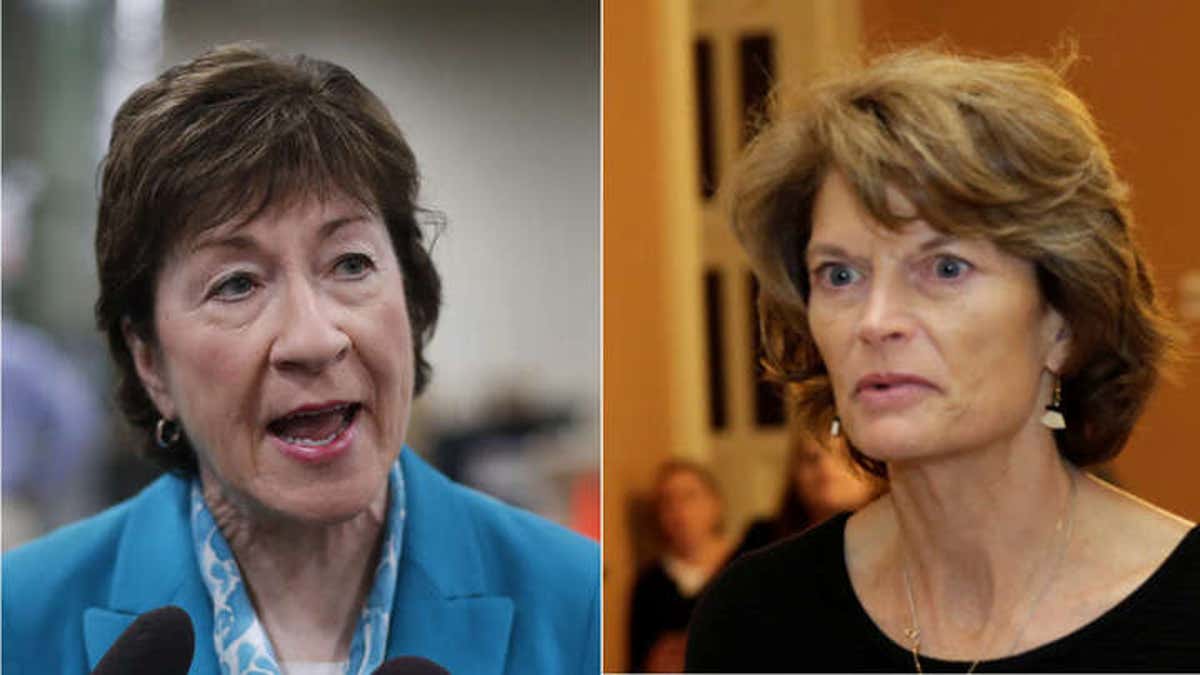Graham-Cassidy health care bill gets last-minute revision as support stalls
{{#rendered}} {{/rendered}}
FILE: Sen. Susan Collins, R-Maine, left, and Sen. Lisa Murkowski, R-Alaska, are two key Republican holdouts on the new health bill
The authors of the Graham-Cassidy health care bill on Sunday appeared to make a last-minute effort to revive the GOP push to repeal and replace ObamaCare with a bill that gives more control to states through block grants.
The New York Times reported late Sunday that the revised bill would provide additional funding for an unnamed “high-spending low-density state”—likely Alaska.
Sen. Lisa Murkowski, R- AK., is one of the Republican holdouts and has said she is evaluating the bill and how it would affect her state.
{{#rendered}} {{/rendered}}Funds would also reportedly be increased for Maine.
Sen. Susan Collins, R- Maine, told CBS on Sunday that “It is hard for me to envision getting to ‘yes’ on this bill because my concerns are so fundamental.”
Collins cited the bill's cuts in the Medicaid program for low-income people and the likelihood that it would result in many losing health coverage and paying higher premiums.
{{#rendered}} {{/rendered}}The new health care bill would undo central components of ObamaCare and replace it with block grants -- or federal funds -- to the states.
The bill would allow states to set their own coverage requirements, allow insurers to boost prices on people with serious medical conditions, end President Obama's mandates that most Americans buy insurance and that companies offer coverage to workers, and cut and reshape Medicaid.
Sen. Bill Cassidy, R-La., one of the bill’s co-authors, reportedly circulated a chart Sunday that showed Alaska receiving 3 percent more funding and Maine receiving 43 percent more. The chart said the legislation's grants would provide 14 percent more for Arizona than under Obama's law, 4 percent more for Kentucky and 49 percent more for Texas.
{{#rendered}} {{/rendered}}Republicans were adding $14.5 billion to the measure for states, according to documents obtained late Sunday by The Associated Press.
The numbers are misleading, partly because they omit GOP Medicaid cuts from clamping per-person spending caps on the program, said Matt House, spokesman for Senate Minority Leader Chuck Schumer, D-N.Y.
In a statement, Schumer said the measure would "throw our health insurance system into chaos."
{{#rendered}} {{/rendered}}Reuters reported that the Senate Finance Committee is set to hold a hearing Monday in an attempt to try and show Democrats are wrong in their criticism. The non-partisan Congressional Budget Office is also expected to produce a preliminary analysis of the bill's impact on budget deficits.
White House legislative liaison Marc Short and Sen. Lindsey Graham, R-S.C., the other co-author of the bill, said Republicans would press ahead with a vote this week.
A vote must occur this week for Republicans to prevail with their narrow Senate majority. Next Sunday, protections expire against a Democratic filibuster, bill-killing delays that Republicans lack the votes to overcome.
{{#rendered}} {{/rendered}}President Trump seemed to distance himself from the showdown, saying his "primary focus" was his party's drive to cut taxes.
"I don't know what they're doing," Trump told reporters about the bill's GOP opponents as he prepared to fly back to Washington after a weekend at his New Jersey golf club. "But you know what? Eventually we'll win, whether it's now or later."
Two GOP senators, Rand Paul of Kentucky and John McCain of Arizona, have already said they oppose the legislation. All Democrats will vote against it. Sen. Ted Cruz said that "right now" he doesn't back it.
{{#rendered}} {{/rendered}}"No" votes from three of the 52 GOP senators would kill the party's effort to deliver on its perennial vow to repeal "Obamacare" and would reprise the party's politically jarring failure to accomplish that this summer.
Cruz said he doesn't think fellow conservative Sen. Mike Lee, R-Utah, backs the GOP bill. Lee spokesman Conn Carroll said Lee wants "technical changes" but hasn't finalized his position.
Paul said even though the bill transforms federal health care dollars into block grants states would control, the GOP bill left too much of that spending intact.
{{#rendered}} {{/rendered}}"Block granting Obamacare doesn't make it go away," Paul said.
The Associated Press contributed to this report
